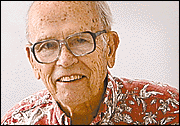Advertisement - Click to support our sponsors.


Hawaii’s World
Helping the homeless
(Second of three articles)
PART I | PART II | PART III
MAJOR Don R. Mowrey, divisional commander of the Salvation Army in Hawaii, has walked up to quite a few street persons and asked if he could be of help. The answer is no answer. These mostly schizophrenic persons simply want to be left alone. They can be picked up and questioned as to whether they are a danger to themselves or others, but must be released if they aren't. They return promptly to the streets.
Mowrey and Susan Chandler, director of the state Department of Human Services, believe in the policy -- pretty much nationwide now after starting in California -- of forbidding involuntary confinement of people who are no threat to themselves or others.
Institutionalization can be pretty awful. The result is that this largest sector of our homeless population is pretty much left alone.
Something can be done, however, for alcoholics and drug addicts if they will submit to treatment. The Salvation Army has programs for this. So do other social organizations.
The state frequently subsidizes some services but the Salvation Army has to raise 60 percent of its $18 million annual spending privately. "We could use still more," says Mowrey, as I'm sure other agencies say as well.
Yet Mowrey, whose organization gives him an international perspective, agrees with Chandler that Hawaii does better than other geographic areas in showing concern for the poor and homeless -- but still not enough. "Poverty is relative," he comments and at a higher level here.
The Salvation Army serves in 105 nations as a part of the Christian church dedicated to preaching the gospel of Jesus Christ and helping "to meet human needs in his name without discrimination." It believes good deeds must be matched by religious evangelism.
In Hawaii it has substance abuse programs, a variety of shelters, a camp for children and families, pre-schools and more. It soon will provide a facility at its Kauluwela Mission on Vineyard Boulevard for Alzheimer's patients. One in 10 Americans over age 65 has Alzheimer's, Mowrey notes.
From a Salvation Army office in Palama Settlement, Chad Buchanan dispenses emergency social services, including financial aid.
He agrees the wide variety of services offered by public, church and other social agencies can seem overwhelmingly complex to a person in need. Some consolidations would be advantageous, he says, in agreement with me.
The needy, otherwise clueless as to where to get help, can always dial ASK-2000, an immensely well-used help and referral service operated by Aloha United Way. It has data on some 300 sources.
I asked if the Salvation Army encounters any starvation in Hawaii. No, he said, but there is widespread malnutrition due to poor diet choices, something the Salvation Army works to educate people out of.
There also are significant numbers of people who go hungry temporarily because they have exhausted their resources.
A harsh fact of life in Hawaii is that most poor people must spend 60 percent of their income on rent. Landlords may give delinquents a grace period of two months at the outside.
The Salvation Army is one of the agencies the Foodbank cooperates with. Buchanan has a closet of food bought from the Foodbank that he can bag for needy applicants.
Poverty and homelessness do not threaten me personally. But they are on my conscience and I feel better because of what I have glimpsed of Hawaii's help network.
Next Tuesday: An overview of poverty.
A.A. Smyser is the contributing editor
and former editor of the the Star-Bulletin
His column runs Tuesday and Thursday.